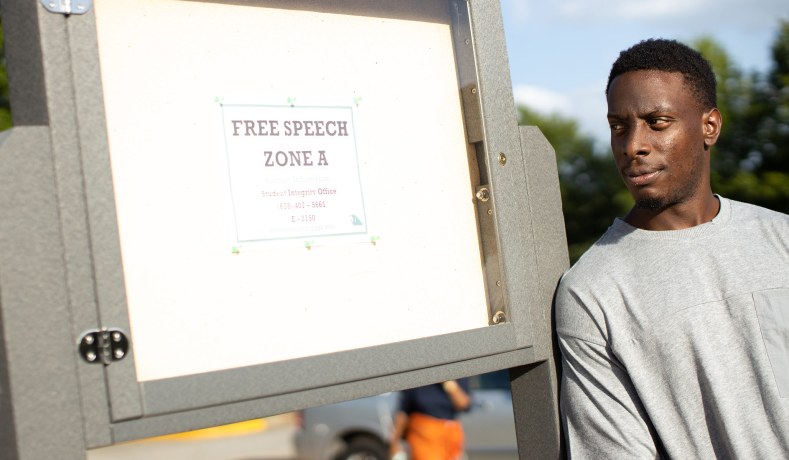Supreme Court Justices throughout American history have, as Elon Musk once told Mark Zuckerberg, demonstrated a considerably “limited knowledge [regarding economics].” Justice Thomas, thankfully, finds refuge in a gold standard of justices.
 Roscoe Filburn with wheat at his farm in Ohio around the time that the Supreme Court ruled against him in a case involving the commerce clause of the Constitution
Roscoe Filburn with wheat at his farm in Ohio around the time that the Supreme Court ruled against him in a case involving the commerce clause of the Constitution
One seminal case establishing a demonstrable lack of economic knowledge by SCOTUS is Wickard v. Filburn (1942). This unanimous decision, coming after FDR threatened packing the court, showed a lack of any knowledge regarding complex economic concepts: supply and markets.
In Wickard, a farmer’s wheat—intended for his own supply—was over his government quota. Thus, it ‘would affect market prices during a period of heavy government intervention during World War II.’ Ironic. So, the government burned Wickard’s oversupply and fined him. The Justices wrongly interpreted Congress's enumerated power over interstate commerce to include noneconomic, intrastate activity.
A local producer who has supplies not for sale does not affect market prices. How can you affect the market when your supply is not for sale? This case was wielded by Congress for decades to expand the administrative state, erode the Tenth Amendment, and proliferate federal power—that is, until economic sanity was brought back to the High Court in the United States v. Morrison. Where Biden’s prized possession was struck down as an illegal use of federal power. In short, it was unconstitutional.
Justice Thomas in Uzuegbunam v. Preczewski this week continued the constitutional trend of upholding civil rights under the proper standard: the government cannot regulate damage-less noneconomic activity. Especially when it comes to free speech and religious freedom—both guaranteed by the First Amendment and protected under federal laws.
The left’s myth about the First Amendment is “a separation of church and state.” But that is obviously a lie. Religious institutions being tax-exempt is one example. Most importantly, the First Amendment states the government cannot “prohibit the free exercise [of religion]” or make any law “respecting an establishment of religion.” It cannot prohibit practicing religion freely. It has to treat religions equally. That’s what is enshrined in the Constitution.
Clarence Thomas this week agreed with the Alliance Defending Freedom, former-Attorney General Jeff Sessions, and the Trump Justice Department by delivering a decisive blow against anti-religious and anti-free-speech bigotry. Something seen being encouraged by the religion of secular leftism.
George Gwinnet College had “free speech zones” where students had to apply for permits and were only permitted to speak 18 hours a week in two spots which comprised .0015 percent of the campus. Uzuegbunam was told that he had to comply if he wanted to preach the Bible to other students. He did. Then, campus police told him he was not permitted to share the Gospel even in the zones. This violated a campus policy of “disturb[ing] the peace/and or comfort of persons(s)” (emphasis mine).
Justice Thomas authored the nearly unanimous opinion, finding that plaintiffs may seek nominal monetary damages for a violation of noneconomic constitutional rights in federal courts. Even if a student is no longer attending the college but had their rights violated by their university, they can still sue. The opinion objected to the “flawed premise that nominal damages are purely symbolic, a mere judicial token that provides no actual benefit to the plaintiff.”
Chief Justice Roberts, shockingly, is the lone dissent. For some reason, arguing that “history” was less clear and the court should not exceed “its modest role.” Ironically stated since, the Court, throughout its history has been anything but modest when it came to expanding the powers of the federal government—and eroding individual liberties, “Endowed by our Creator.”
These expanded powers have come on the heels of cases where federal power was found to be not expressed or written down anywhere in the Constitution.
Thomas drops the mic by stating Congress, who has the power to set federal law, places “no minimum-amount-in-controversy requirement on federal courts’ jurisdiction over violations of [federal and constitutional] rights.” Indeed, Uzuegbunam will become a paramount precedent for the exoneration of core constitutional rights, now and into the future. A true win for Lady Justice. This precedent will allow victims of constitutional deprivations to hit those who caused violations where it hurts: pocketbooks.
With Democrats rampantly engaging in threatening to “restructure” and outright signals to pack the court recently, it is comforting to see Justice Clarence Thomas and others courageously answer calls for freedom from coercive conduct by those in power.
This article first appeared at the Rogue Review, where Mackenzie is a Columnist.



